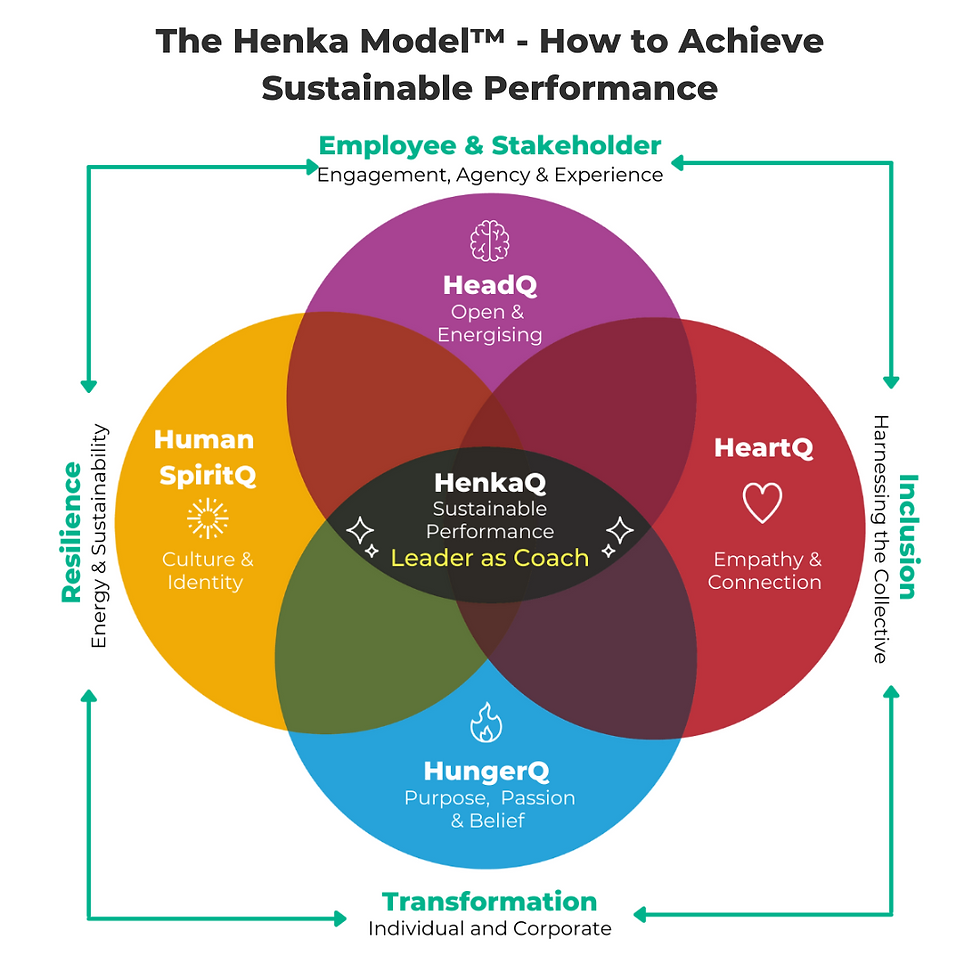Leadership Skills in 2024: The Shift Towards a Coaching Culture
- The Henka Institute

- Dec 15, 2023
- 3 min read
As the business landscape continues to evolve rapidly, leaders and organisations are compelled to adapt, innovate, and restructure their strategies to stay at the cutting edge. The future of leadership is shifting towards a more holistic approach, with a focus on developing a coaching culture within organisations.
By 2024, leadership skills will be more about coaching and empowering than about directing and controlling. Leadership Skills will be the cornerstone of organisational success and transformation.
The Importance of Leadership Development
Leadership development is about equipping leaders with the necessary skills and abilities to guide their teams effectively, innovate, and make strategic decisions that drive organisational success. As we look ahead to 2024, the focus of Leadership Development will be on nurturing leaders who can navigate the complexities of the modern business world while promoting a culture of continuous learning and development.
A Shift Towards Emotional Intelligence
Emotional Intelligence (EQ) will be a critical leadership skill in 2024. Leaders who can understand, manage, and navigate their emotions and those of their team members will be highly valued. EQ enhances communication, builds trust, and fosters a positive work environment. It contributes significantly to employee engagement, team performance, and organisational outcomes.
The Power of Continuous Learning
In a fast-paced, technology-driven world, leaders must commit to lifelong learning. Keeping up to date with industry trends, emerging technologies, and evolving consumer behaviours is not a luxury; it's a necessity. Leaders who embrace continuous learning promote a culture of curiosity, innovation, and adaptability within their organisations.
The Rise of AI and Technology
The rise of AI and technology is revolutionising the way leaders operate. From data analysis to decision-making, technology empowers leaders to be more effective, efficient, and innovative. Leaders who can leverage technology to enhance productivity, boost performance, and drive organisational success will be highly sought after in 2024.
The Evolution of the Leader as Coach
As we approach 2024, there is a clear shift towards the Leader as Coach model. Leaders are no longer just decision-makers; they are mentors, facilitators, and coaches. By adopting a coaching approach, leaders can build trust, inspire their teams, and promote a culture of collaboration and continuous improvement.
Building Trust and Strengthening Relationships
The Leader as Coach model emphasises the importance of building trust and strengthening relationships. Leaders who can build strong, authentic relationships with their team members create a supportive environment where individuals feel valued, heard, and motivated to achieve their best.
Fostering Team Collaboration
Leaders who adopt a coaching approach foster a culture of collaboration within their teams. They encourage open communication, value diverse perspectives, and promote collective problem-solving. This collaborative approach enhances team performance, drives innovation, and contributes to organisational success.
Unlocking Individual Potential
As coaches, leaders play a pivotal role in unlocking the potential of their team members. They inspire and motivate individuals, helping them to realise their capabilities and achieve personal and professional growth. This enhances individual performance and contributes to the overall success of the organisation.
The Benefits of a Coaching Culture
Creating a Coaching Culture within an organisation can significantly improve a leader's abilities to lead effectively and drive organisational success. A coaching culture fosters a positive and productive work environment that benefits both employees and the organisation as a whole.
A coaching culture leads to enhanced performance, improved employee satisfaction, better leadership, and a more resilient and adaptive organisation. Data shows that people who feel they have a great coaching relationship report an 80% increase in self-confidence, improved relationships (73%), communication skills (72%), interpersonal skills (71%), and work performance (70%).
Cultivating a Coaching Culture with The Henka Institute™
At The Henka Institute™, we focus on coaching leaders to become top performers who influence teams and go on to influence organisational success. Our Coaching Leadership programmes, the core of which are ICF-accredited, are designed to embed a coaching culture in organisations.
The Five HenkaQs™ Approach
Underpinning our approach are the Five HenkaQs™ that support leaders to develop the courage to consciously recognise when, where, how, and with whom to tap into each of their Five HenkaQs™ for healthy, collaborative, and transformational growth. In the process, they deliver winning experiences for employees and stakeholders.

Conclusion
The future of leadership is about more than just managing teams or driving profits; it's about setting an example of balanced success, promoting continuous learning, adaptability, and development, and guiding organisations on their journey towards transformation.
As we journey towards 2024, let's embrace the Leader as Coach model and the power of a coaching culture for organisational success and transformation.





Comments